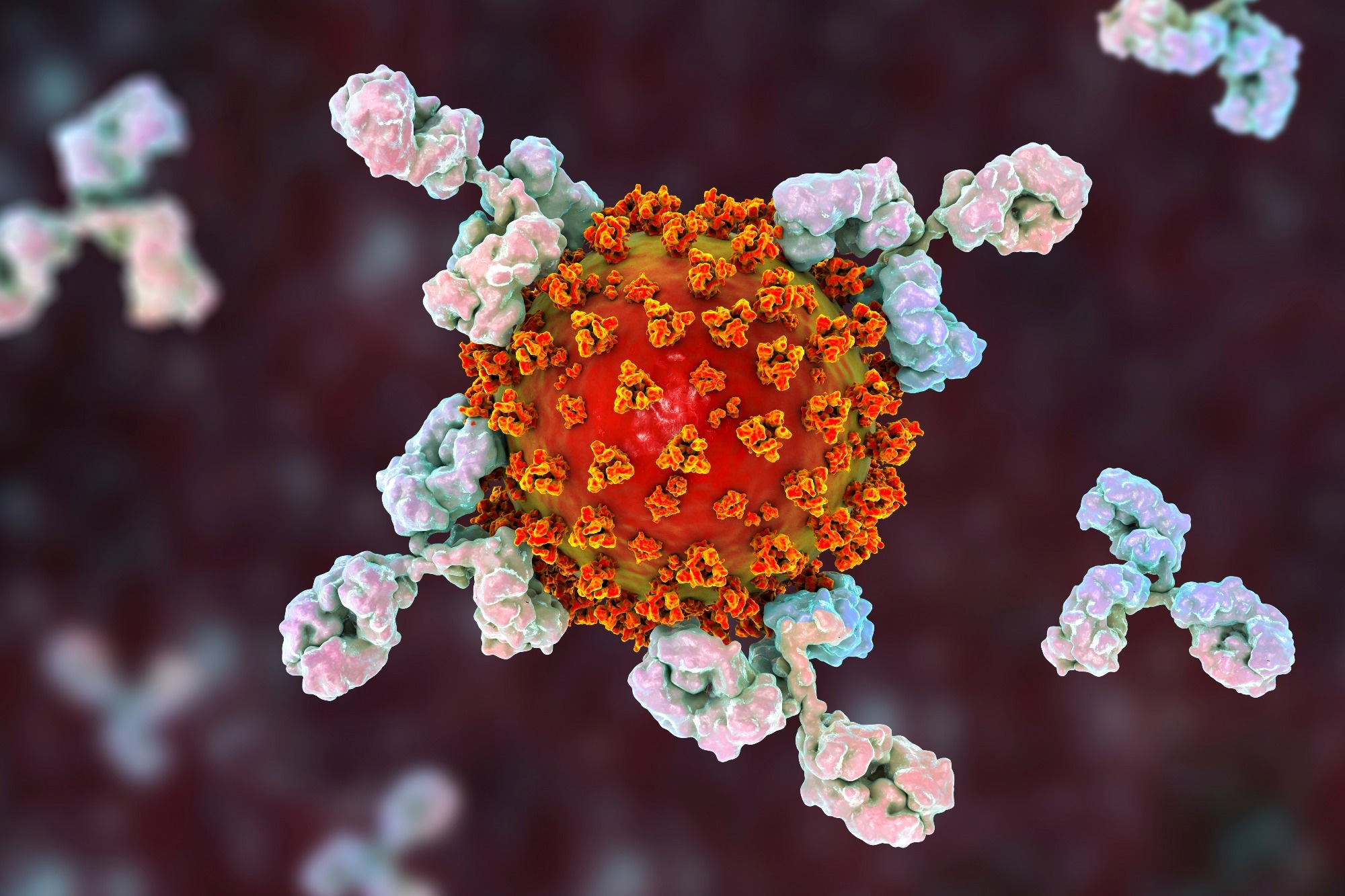A recent article published in the journal Clinical Infectious Diseases assessed the kinetics of anti-severe acute respiratory syndrome coronavirus 2 (SARS-CoV-2) antibodies derived from mothers among infants in association with the timing of prenatal SARS-CoV-2 vaccination.
 Study: Kinetics of maternally-derived anti- SARS-CoV-2 antibodies in infants in relation to the timing of antenatal vaccination. Image Credit: Kateryna Kon / Shutterstock
Study: Kinetics of maternally-derived anti- SARS-CoV-2 antibodies in infants in relation to the timing of antenatal vaccination. Image Credit: Kateryna Kon / Shutterstock
Background
Pregnant women with SARS-CoV-2 infection are known to be at increased risk for severe coronavirus disease 19 (COVID-19). The Centers for Disease Control and Prevention (CDC) has documented over 190,000 SARS-CoV-2 infection cases among pregnant women since January 2020, with over 250 COVID-19-related deaths. Furthermore, COVID-19 during pregnancy is connected to an elevated risk of unfavorable maternal and perinatal outcomes.
Prior studies have shown that SARS-CoV-2 vaccinations were efficient in the context of pregnancy, with a good safety profile. In addition to its significant role in reducing maternal disease, antenatal COVID-19 vaccination may give neonatal immunity in the early, sensitive phases of life. However, compared to older children, SARS-CoV-2 infection in early infancy can lead to severe COVID-19.
The present study's authors and others priorly demonstrated that antenatal COVID-19 vaccination results in an effective transplacental transfer of maternally generated anti-SARS-CoV-2 antibodies. Understanding the function of these passively gained antibodies in sustaining newborn immunity and developing preventative interventions requires determining their persistence.
Anti-SARS-CoV-2 spike (S) antibodies were found to remain in newborns after maternal vaccination during 20 to 32 weeks of pregnancy, according to Shook et al. Neutralizing antibodies, on the other hand, were not examined, and women vaccinated at late or early gestational ages were excluded. Moreover, it is uncertain if breastfeeding affects the systemic concentrations of SARS-CoV-2 immunoglobulin G (IgG) antibodies.
About the study
Given the high clinical relevance, in the present prospective longitudinal research, the investigators aimed to evaluate the kinetics of anti-SARS-CoV-2 neutralizing and S antibodies across infants after COVID-19 vaccination of mothers at different phases of pregnancy and during the early postpartum stage. The team examined how long maternally-stemmed anti-SARS-CoV-2 antibodies lasted in infants and how they correlated with prenatal vaccination timing.
The study was performed at a university-affiliated hospital, Hadassah Medical Center, in Jerusalem, Israel, from February through November 2021. Parturients with premature deliveries, SARS-CoV-2 vaccinations after 36 weeks of pregnancy, those who did not finish the two-dose vaccination regimen before delivery, and multifetal gestations were omitted from the research. The included females completed the two-dose COVID-19 vaccination regimen within the advised time window, i.e., three to four weeks and more than two weeks before delivery.
All mothers were screened and confirmed to be nucleocapsid IgG-negative. None of the included women had a known immunodeficiency or received immunosuppressive therapy. Clinical and demographic data were procured during enrollment.
The team also included an additional control cohort of entirely breastfed three-month-old babies whose mothers were not SARS-CoV-2 vaccinated during pregnancy and finished the two-dose COVID-19 BNT162b2 vaccination course within the initial month of delivery.
After antenatal BNT162b2 immunization, sera were obtained prospectively from mother and infant pairs at delivery and three months after childbirth. The researchers assessed IgG titers and neutralizing capacity specific to the SARS-CoV-2 receptor-binding domain (RBD).
Results
The study results illustrated that the research included 56 mother and infant pairs. Besides, 15 women, i.e., 26.8%, were vaccinated during the first trimester, 16, i.e., 28.6%, during the second trimester, and 25, i.e., 44.6%, during the third trimester.
Anti-SARS-CoV-2-RBD-selective IgG was identified in all neonates at delivery time, with an average titer of 4046 AU/mL, with the maximum concentration found following third-trimester vaccination (median 6763 AU/mL). Anti-RBD-specific IgG concentrations in infants were dramatically decreased at three months following delivery, with a median titer of 545 AU/mL. Anti-RBD-specific IgG had a half-life of 30 days in infants and 66 days in mothers.
All neonates had measurable neutralizing activity at the time of delivery, irrespective of gestational age at vaccination. However, a higher percentage of infants born to mothers vaccinated in the third trimester had sustained SARS-CoV-2 neutralizing activity at three months of age than those born to mothers immunized in the second trimester.
Collectively, the current findings show that maternal COVID-19 vaccination results in an efficient placental transfer of IgG antibodies targeting SARS-CoV-2 and their persistence in the early months of birth. These data emphasize the critical impact of antenatal SARS-CoV-2 vaccination in protecting both the mother and the baby.
Conclusions
According to the study findings, maternal COVID-19 vaccination results in significant transplacental anti-SARS-CoV-2 antibody transfer, with persisting antibodies found in all infants at three months of age. The team found that independent of gestational age at vaccination, all neonates harbored quantifiable SARS-CoV-2 neutralizing ability at birth, followed by a considerable decline of antibody titers with a total predicted half-life of little above four weeks.
Relative to vaccination at an earlier gestational age, third-trimester prenatal vaccination was linked to a greater rate of persisting neutralizing function and enhanced neutralizing antibody concentration at three months in infants. The observed impact of prenatal vaccination timing on the kinetics of maternally-stemmed antibodies could have ramifications for SARS-CoV-2 vaccination approaches.
Furthermore, the scientists noted that the mechanisms driving the difference in antibody decay rates among newborns and mothers and their relationship to gestational age at vaccination were yet unknown. Besides, a better knowledge of the unique kinetics of the maternally acquired IgG in neonates was required to inform the development of measures to boost their persistence.
- Amihai Rottenstreich, MD, Gila Zarbiv, RN, CNM, Esther Oiknine-Djian, PhD, Olesya Vorontsov, MSc, Roy Zigron, MD, Geffen Kleinstern, PhD, Shay Porat, MD, Dana G Wolf, MD; Kinetics of maternally-derived anti- SARS-CoV-2 antibodies in infants in relation to the timing of antenatal vaccination. Clinical Infectious Diseases, 2022, ciac480, DOI: https://doi.org/10.1093/cid/ciac480, https://academic.oup.com/cid/advance-article/doi/10.1093/cid/ciac480/6611486
Posted in: Medical Research News | Medical Condition News | Women's Health News | Disease/Infection News
Tags: Antibodies, Antibody, Baby, Breastfeeding, Childbirth, Children, Coronavirus, Coronavirus Disease COVID-19, covid-19, Hospital, immunity, Immunization, Immunodeficiency, Immunoglobulin, Infectious Diseases, Newborn, Pregnancy, Prenatal, Receptor, Research, Respiratory, SARS, SARS-CoV-2, Severe Acute Respiratory, Severe Acute Respiratory Syndrome, Syndrome

Written by
Shanet Susan Alex
Shanet Susan Alex, a medical writer, based in Kerala, India, is a Doctor of Pharmacy graduate from Kerala University of Health Sciences. Her academic background is in clinical pharmacy and research, and she is passionate about medical writing. Shanet has published papers in the International Journal of Medical Science and Current Research (IJMSCR), the International Journal of Pharmacy (IJP), and the International Journal of Medical Science and Applied Research (IJMSAR). Apart from work, she enjoys listening to music and watching movies.
Source: Read Full Article
